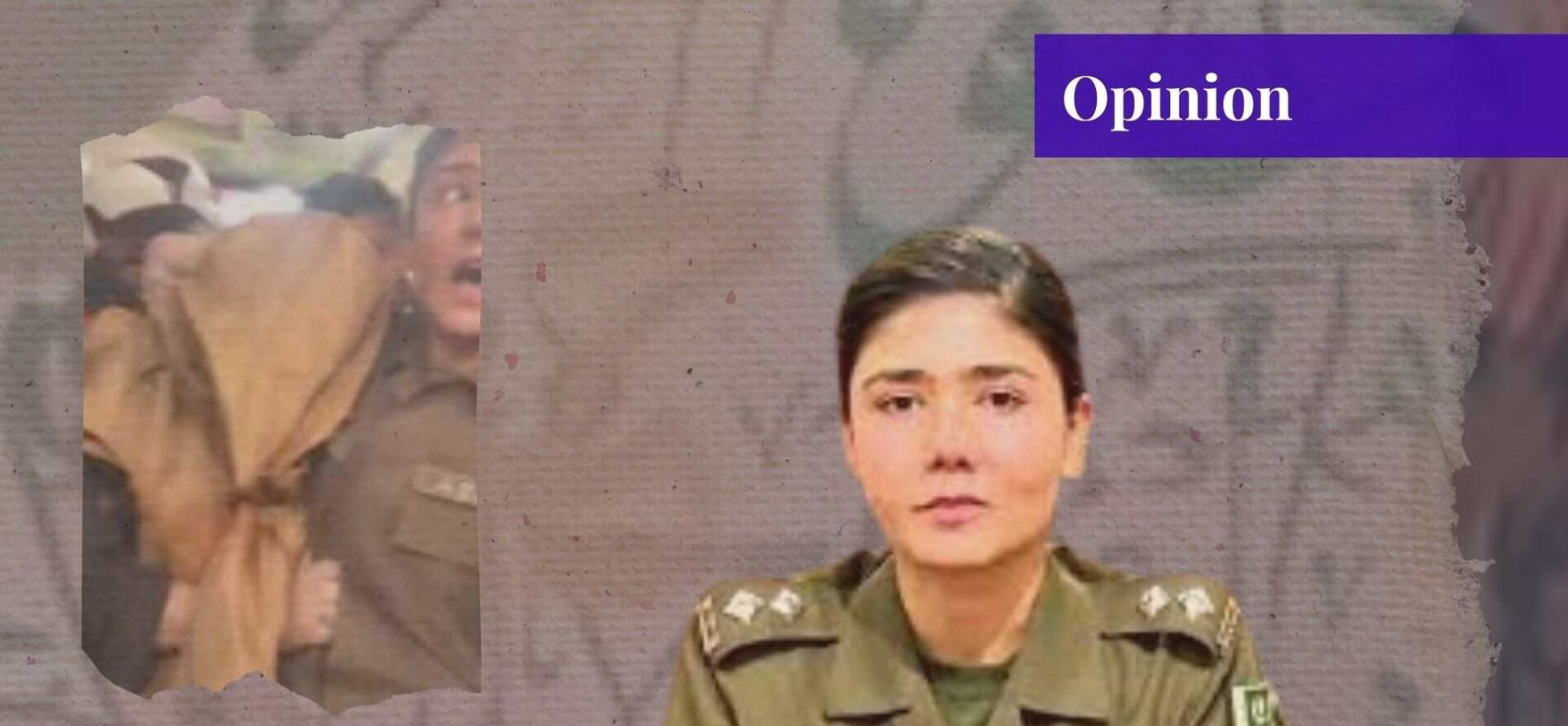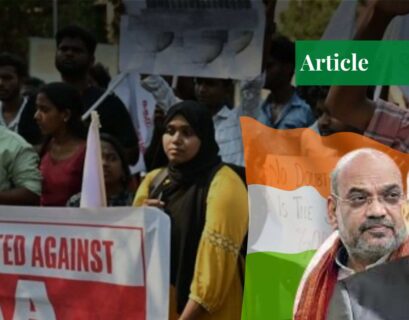Originally from Chitral but born and raised in Islamabad, Ms Kalsoom Daad Khan holds a degree in Gender Studies from
Quaid-i-Azam University, Islamabad.
The Islamic Republic of Pakistan has, since its inception, trialed religion for its vested interests. From giving a safe impression for conducting religious terrorism to containing the rights of minorities, the country has subscribed to various offers. The year 2023 witnessed plentiful cases of false alleged blasphemy, among which the most notable was the Jaranwala incident in Faisalabad, Punjab.
The episode caught both national and international media attention when a furious mob attacked a Christian settlement in the region after two members of the community were accused of committing blasphemy. Human Rights Watch reported that the crowd, armed with stones and sticks, defaced several churches, dozens of houses, and a cemetery under aggression for the digressive law.
The most recent event happened in Lahore where an angry mob surrounded and nearly killed a young lady for wearing a kurta with Arabic script. Thankfully, a fearless police officer rescued the female and disintegrated the mass.
What is blasphemy? What are its legal bindings in Pakistan, and how is it actually perceived in the country? Let’s inspect them one by one. Firstly, the term ‘blasphemy’, is not an Arabic term or rooted in any Islamic tradition. According to a recent article by the Islamabad Policy Research Institute (IPRI), the term is a Greek word that originally meant ‘word crime’ as stated by Joss Marsh. Therefore, it is only applicable to proven and intentional religious hate speech rather than acts of written or object crimes, as was missing in both the cases of Jaranwala and the latest Lahore incident.
J. Barton Scott, associate professor of historical studies and the study of religion at the University of Toronto, believes that these distinctions in blasphemy collapse in practice, and therefore the term should not be narrated thoughtlessly and needs more judicious explanation.
Secondly, the introduction to the so-called blasphemy laws, which in actuality are not blasphemy offenses but rather are labeled as ‘offenses relating to religion’ as evidenced by Chapter XV of the Pakistan Penal Code which were added during the extremist regime of President Zia-ul-Haq. The Zia era laws, contrary to the colonial era, disregard intention as a condition. According to the Human Rights Commission of Pakistan (HRCP), these offenses are therefore being misused to initiate hatred against anyone.
Scholars such as Javed Ahmed Ghamidi deny the violence perpetrated in the name of blasphemy and state that no individual has been given the right to give a penalty to any other individual in the name of blasphemy as it is against the Quranic junctions, as proven via QIV:140: “(God) has instructed you in the Book that when you hear God’s revelations being denied or ridiculed, you must not sit and listen to them unless they engage in other talk, or else you shall yourselves become like them.”
Similarly, regarding religious hate speech, the Quran instructs Muslims not to listen to it and to walk away: “When you see those that scoff at Our revelations, withdraw from them till they engage in other talk” (Q VI: 68). God takes on the responsibility of punishing those who ridicule Islam. In QIV:140, God states that “God will surely gather in Hell the hypocrites and the unbelievers all’’. “Judge with fairness” (Q IV&V: 58–42) and “Do not allow your hatred for other men to turn you away from justice. Deal justly; that is nearer to true piety” (Q.V. 8). These Quranic references, therefore, cannot justify violent acts over blasphemy and ask Muslims to ignore any vague understanding of the faith and act with justice.
As reported in IPRI, according to Ghamidi, blasphemy laws are “totally baseless “and against the Holy Quran, ahadith, and fiqh (jurisprudence).” Dr. Shehzad Saleem, a former disciple of Ghamidi, approves the vitality of proof if such an incident occurs and speaks up about giving the victims a chance to explain their intent before declaring a death sentence under Section 295-C which was amended under the Ismail Qureshi vs. The Government of Pakistan 1991 as a hadd offense such that those found guilty were either given imprisonment for life or the death penalty as options.
According to Dr. Saleem, blasphemy in Pakistan is viewed as an act of apostasy (the act of renouncing belief in Islam) and therefore has been viewed as punishable by death for decades. Apostasy, according to him, was only applied to polytheists, who again reverted to polytheism after converting to Islam. Therefore, either killing an apostate or a blasphemer is not valid today. He writes, “The attempt to treat all those who insult the Islamic faith as synonymous with apostates naturally collapses in practice, since not all who insult the Islamic faith are Muslims. Thus, regardless of their actions, they cannot be considered apostates of the Islamic religion.”
Muhammad Mushtaq Ahmad also challenges the Pakistan Penal Code (PPC) on a legal and religious level. He notes that Hanifa’s successor, Al-Ansari, asserted that if the blasphemer repents, the death penalty is commuted within the Hanafi school because this is the rule in the case of apostasy. In this regard, the Federal Sharia Court has failed to submit explanations and is ambiguous about the blasphemy laws in Pakistan that need substantive revision.
Taking into account the aforementioned scenario, some recommendations such as educational, legal, and police reforms, should be taken into consideration. Awareness in educational institutions like schools, madrassas, etcetera must teach the difference between a sacred text and common Arabic writing, as in the case of the late Lahore incident. Police units should be trained skillfully to protect the alleged victim and to handle angered mobs in such critical situations with patience and dialogue.
Last but not least, blasphemy laws should be reviewed to prevent them from being misused in Pakistan. HRCP suggests that there must be a law to punish those who falsely accuse people of blasphemy similar to Section 496-C of the PPC, where a person can be imprisoned for up to five years and charged a fine worth up to ten thousand rupees if they make a false charge of fornication, as declared by Maulana Tahir Ashrafi in 2013, which was then retracted again.
Moreover, the distinction between apostasy and insulting Islam should be made clear, as these two are not the same thing, and the option of repentance under 295-C must be revised so that the death penalty should not be the ultimate choice. Lastly, ‘intention’ should be considered an essential ingredient of the offense of blasphemy. Al-Qari states while explaining the position of Hanifa, “In an issue of kufr, if ninety-nine interpretations of a statement prove kufr but one interpretation negates kufr, the muftī and the qāḍī (Qazi) both should adopt the interpretation that negates kufr because a mistake in letting a thousand unbelievers [live] is lesser than a mistake in killing a believer.”
If you want to submit your articles, research papers, and book reviews, please check the Submissions page.
The views and opinions expressed in this article/paper are the author’s own and do not necessarily reflect the editorial position of Paradigm Shift.



















